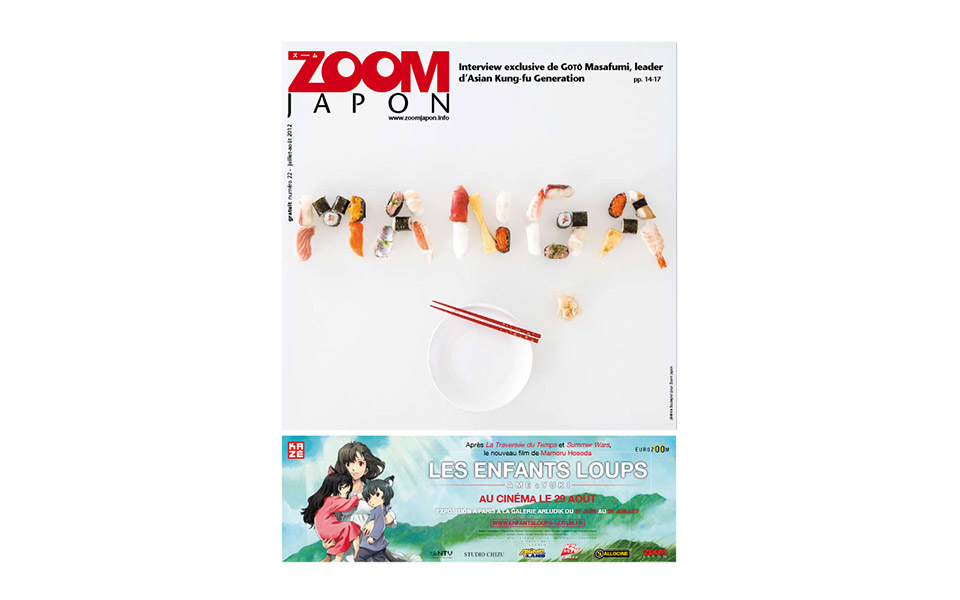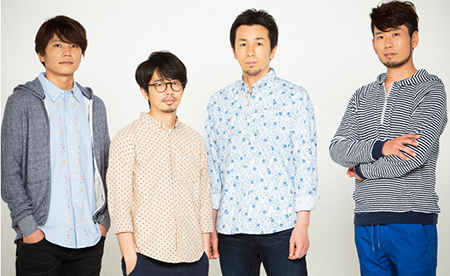Asian Kung-Fu Generation's interviews
Zoom Japan 022

Alissa Descotes-ToyosakiThe leader of the band Asian Kung-Fu Generation wants to bring the Japanese youth to take in hand its destiny. Masafumi Gotoh, one of the Japanese rock icons, takes his role very seriously. This 36 year old guitarist founded the band Asian Kung-Fu Generation (AKG) in 1996. Almost by accident he came to be the editor-in-chief of a paper whose name carries with it the hopes of Japan's post-Fukushima generation. The Future Times was created 4 months after the triple disaster that took place on March 11 2011. To Masafumi Gotoh, this initiative is the natural follow-up to his involvement in pop music. According to him, art draws inspiration from popular culture and its main role is to convey messages. Like troubadours in the Middle Ages who spread the news across the country through their poems and musical performance, the singer has taken upon himself the role of messenger. By gathering the stories of victims and people active in reconstruction, The Future Times, which is distributed for free every three months, is astonishing both in the quality of its graphic design and its journalism. Faithful to both the style pop art and manga inspired sensibilities of Asian Kung-Fu Generation's album sleeves, The Future Times aims to reconsider Japan from ground zero, as stated in the first issue's editorial. As both editor-in-chief and reporter, Masafumi Gotoh tries to understand how Japan arrived at such a crisis of identity as well as an environmental and energy crisis. All the while he tries to offer the reader an image of a better possible future. Affectionately nicknamed "Gotchi", this pop, rock and sometimes punk influenced musician, writes piratically all of his own songs and also shows an affection for the poetic and futuristic atmosphere found in mangas. Several Asian Kung-Fu Generation's songs were even used as soundtracks for anime such as Naruto, Fullmetal Alchemist and Bleach. Never a very good student, at first he failed the entry exam to study agriculture before going on to college to study economics, where he learnt to play guitar. That is when he met the other members of Asian Kung-Fu Generation, nicknamed Ajikan by their fans. They have become a landmark in the world of rock and appear not to have aged at all in the past 15 years. Among their many hits is a song inspired by Solanin, Asano Inio's manga talks about the discomfort of youth, stretched between life-long employment and marginalisation. In its repertoire, Ajikan favours topics that are important to youth. Since the 11th March 2011 the band has included the nuclear legacy in its songs. N2, a song to be released on their forthcoming album, encourages "not always to believe, but to seek and question" the government's reassuring words. In a context in which die-hard anti-nuclear activism severely criticises Japanese show business, Masafumi Gotoh's approach explains why The Future Times editorial lines favours reflection and how he envisages the future of Japan.
Alissa Descotes-ToyosakiThe Japanese government decided to open gradually the 20km forbidden area around the Fukushima-Dai-ichi nuclear power station. What do you think of this decision?
Masafumi GotohThis is very difficult to have a global opinion on that matter. If it was a friend or a member of my family, I could tell them that it is not reasonable to go back in the zone now, because we still have a lack of informations. But I can't allow myself to say the same thing to someone I don't know. I try to step into the people's shoes who lived there and want to come back, and at the same time evaluate the real risks for health. All I wish is that we can renovate this region even if it takes a century. I think that the Fukushima's prefecture is not destined for being left, but at the contrary, it can be used to the development of new technologies.
Alissa Descotes-ToyosakiA lot of mothers want to move with their children, as it is in the Fukushima city. Do you think that their evacuation has to be supported by the government?
Masafumi GotohI think people who want to leave must have the possibility to do so. We are in a situation where, again, it is difficult to take things into consideration. For instance, a lot of mothers also decided to stay. For my part, I can't solve or impose an opinion to others. I admit to still be very hesitant on that matter. For example, I thought to rent an entire building in my mother region of Shizuoka to help the refugees out. But in the case of Fukushima, this is not about a few families but almost 2 millions of refugees. We can't evacuate the whole prefecture. On the other side, when we think about children and the problems they are risking, it is unbearable. The evacuation process is a very serious problem and question the government's responsibility who in case of environmental crisis always tend to minimize the consequences. This is the mechanism of Japan's society that must be changed.
Alissa Descotes-ToyosakiTherefore your wish to wake up the Japanese people's consciousness with a a publication like The Future Times?
Masafumi GotohYes, those who listen to our music are young people. They will go to college, and will begin their professional life in the next 10 years. But it is now we must talk to them and put them on the alert. The actual situation of Japan didn't come in one go. It is the result of several dozen years of management. That way, it is essential to prepare now the tomorrow's generation.
Alissa Descotes-ToyosakiYou recently gave the number of demonstrators against the reboot of the Ôi nuclear power station. Though seen from overseas the number of 11000 seems derisory. Why is it so rare to demonstrate in Japan?
Masafumi GotohThis is another question that anguishes me a lot! Japanese people are used to, we say, to "read the air" that is to say they smell the general atmosphere before taking any decisions. They don't like to stand out or causing trouble. Education has a lot to in that kind of behaviour, because at school we are taught to not get out of line. In that context, a demonstration in front of the Prime Minister resident that gather 11000 people, this is huge in Japan!
Alissa Descotes-ToyosakiIn an interview published in The Future Times, Sakamoto Ryûichi evokes the term "hisen" which, word by word, means "no-war" a term even stronger than the common word "taisen", "against war". Does the global action against the nuclear energy draws closer of this pacific notion?
Masafumi Gotoh3 millions of Japanese lost their life during World War 2. Moreover, Japan is still unpopular by many Asian countries even after 70 years of peace. What I want to say, is that for us, generation born in the 70's, demonstrations that took place in the 60's for peace and against the nippo-american security treaty are not even an example. We rather think this is exactly those people who possess the power in the big companies. In that context of "heiwa-boke" where people are like stupefied by peace, anti-nuclear demonstrations that have begun last year are a comeback without precedent. There are of course pacific militants from many years that participate to it, but for the youngest, it is the first time that they demonstrate. Even myself I feel ashamed to say it, but I have participated to my first demo two months ago at the age of 36! For us, it is about an apprenticeship where first we have to ignore other's opinion. Because in Japan, we see the demonstrators like strange or even dangerous beast. That's why organisers are doing everything for that everything is well organised and without misbehaviour. Their goal is to show that the demonstrators are not terrorists. They can also win the trust of a growing people who will come, in their turn, to demonstrate. As for me, I'm telling myself sometime, that I should give a speech during those demos, because I relay the information to more than 99000 fans that are following me on Twitter. But I still can't go for it. I tell to myself that indeed if I do it, a lot of people will categorise me and The Future Times will end to lose its credibility. That's sad, but that's the way it is for now. Sometime, I wish to have the opinion of strangers to teach us how to organise demonstrations more active!
Alissa Descotes-ToyosakiYou organise with Sakamoto Ryûichi the festical No Nukes 2012 that will be held the next 7th and 8th July. Will you give a speech there?
Masafumi GotohYes, I think that every artist will say something. This is a festival created by Sakamoto's initiative where every receipt will go to the organisation "10 Millions of signatures to say goodbye to nuclear energy" who set up demonstrations in favour of going out from the nuclear energy. For my part, I will sing the song "N2" composed after the 11th march 2011. It is easier for me to sing than giving speeches.
Alissa Descotes-ToyosakiThe Future Times allow a big signification to renewable energies, do you think that Japan will go that way despite the reboot of the Ôi nuclear power station's reactor?
Masafumi GotohIn any case I think that Japan has to go out from nuclear as soon as possible. Little by little, people have to turn toward the renewable energies, even if it is a little expensive. If the government have chosen to reboot the reactors, most of the Japanese people want to go out from nuclear energy. In a seismical country, the risk is too high. It's become clear for everyone. Otherwise, there is much to do as a matter of saving energies, mostly in Tokyo. Even the escalators ramps are enlighten the night. What's that for? There is also a huge work to do with architects, designers, everybody that are concerned with town planning and development. This is those kind of people who are contributing to think about environment. We all have a role to play to think over the world of tomorrow.

